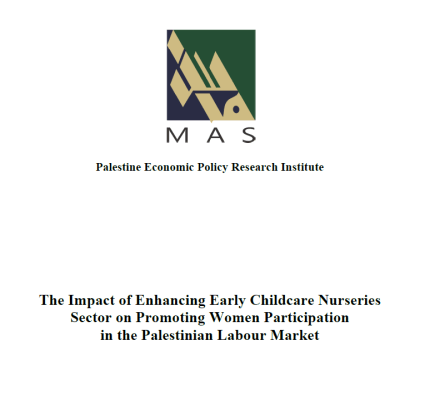The Impact of Enhancing Early Childcare Nurseries Sector on Promoting Women Participation in the Palestinian Labour Market (Summary)
The purpose of this study is to bridge the gap in knowledge on the reality of nurseries in Palestine, by providing a comprehensive analysis and description of all aspects and determinants of early childhood care at formal and home-based nurseries. Globally, this sector has come to be known as the “care economy”. More specifically, this study is concerned with the relationship between this sector and gender equality in job opportunities in the private and public sectors. It formulates recommendations on methods to improve both early childhood care services and working conditions at nurseries, contributing to the need to support Palestinian women’s entry into the labor market. This study also outlines recommendations for strengthening policies for the adoption of nurseries at the workplace, and for investing in childcare centers and associated facilities. These recommendations cover the reform of labor regulations and improving work conditions, helping to create more equal opportunities for women to benefit from decent employment within the labor market.
The study revealed that early childhood care services are limited; if such an option is available, it may not feasible, it may be too expensive, or it may not provide a safe and stimulating environment for the child. The provision of early childhood education/care centers for children under the age of five is exclusively limited to service providers from the private sector, with no provisions by the public sector. Enrollment depends to a large extent on the family’s income. The survey results and interviews showed that numerous provisions of the labor law are clearly violated, where a significant percentage of female workers at nurseries do not enjoy the rights stipulated by the law. Female workers at nurseries are routinely denied maternity leave, sick leave, end-of-service compensation and are paid less than the minimum wage. Moreover, there is a large discrepancy between the West Bank and Gaza Strip, especially in the level of wages. The study recommends activating the roles of both the Ministry of Social Development and the Ministry of Labor in this regard. There is a need to coordinate efforts between them, such that they can play a comprehensive and effective role in monitoring licensed nurseries, strengthening their control and supervision to ensure that workers enjoy the full rights afforded to them by Palestinian labor laws.
We extend our thanks to the International Labor Organization (ILO) and its Palestine office for providing MAS with the opportunity to conduct this study, under their regional programme “Promoting Productive Employment and Decent Work for Women in Egypt, Jordan, and Palestine (Work4Women)" implemented in cooperation with the United Nations Women’s Agency with funding from the Government of Sweden, and the Swedish International Development Cooperation Agency (SIDA). We also thank them for providing the facilities required for the implementation of the study, and for passing on information and ideas. Moreover, we extend our thanks to the research team at MAS and the Palestinian Central Bureau of Statistics (PCBS) for their noteworthy efforts in collecting quantitative data and completing this process within the allocated timeframe. We also thank everyone who contributed to supporting - and dedicating time and effort to - the implementation and preparation of this study. This includes representatives of the Ministry of Social Development, the Ministry of Education, the Ministry of Labor, trade unions, local and international organizations active in the field of early childhood care, and survey participants such as the owners of nurseries and daycare givers. These stakeholders enriched this study with information on the reality of early childhood care in Palestine, participating in detailed discussions on challenges, opportunities and practical recommendations that can contribute to the further development of this national, strategic sector.

